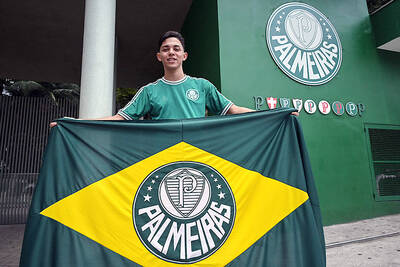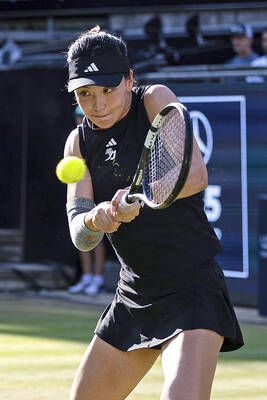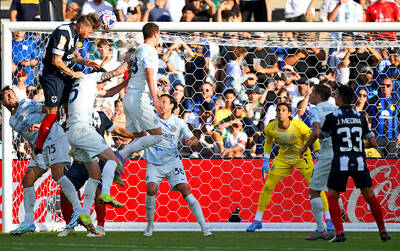Indonesia soccer captain Boaz Solossa is known for his quick turn of pace and sharp instincts — as well as his eye for goal.
However, he is not alone: Solossa is just one of many outstanding players born and bred in the far-flung, rebellious province of Papua, which has become known as a breeding ground for athletic talent.
In the eastern province, one of Indonesia’s poorest, genetics and geography have combined to produce a string of successful players and teams.
Solossa’s club Persipura Jayapura, known as the “Black Pearls” because of Papuans’ dark skin, have won the national title five times, making them Indonesia’s most successful team.
It is a proud achievement for Papua, known for its low-level insurgency and antipathy toward Indonesia’s Javanese rulers since it was annexed in the 1960s.
Papuans come from Pacific-origin Melanesians and the province, bordering Papua New Guinea, has a warlike, tribal past including cannibalism.
Modern Papuans are known for their athleticism and particularly their soccer, which they play from a young age and often at high altitude in the mountainous region.
Elvis Howay, a coach in Solossa’s hometown of Sorong, says it is the early exposure to soccer which sets Papuans apart.
“Whether it’s a small field or a field with a 3m goalpost, the children of Papua are used to playing soccer everywhere,” he said. “That’s why they are mostly better than the children in Jakarta.”
Solossa, 31, the youngest of five children, has progressed to become one of Indonesia’s most celebrated players, scoring nearly 200 goals for club and country.
This year, he became the first Indonesian to be ranked among Asia’s top 50 players by FourFourTwo magazine.
“I think it’s genetic. Our father was also a soccer player, though not professional. We are all professional footballers, but my younger brother Boaz is the best,” said his brother, Joice Solossa.
Soccer commentator Akmali Marhali, who works with the Save Our Soccer think tank, said Papuan players have a well-earned reputation for fitness and agility.
“Their physique supports them to become athletes. Their geographical conditions as well,” he said.
Although Indonesia has had little success in international soccer beyond Southeast Asia, the prowess of Papua’s players has echoes in other hotspots of soccer talent.
Their experience has similarities with South America, where impoverished, but athletically gifted children spend hours every day with a ball at their feet, resulting in the world-beating teams of Brazil and Argentina.
“Most of the players have been playing soccer since an early age and God has given the children of Papua a certain privilege,” Persipura Jayapura media officer Bento Madabun said.
“They are born with great talent which is strengthened by the situation in their region and their hard life,” he added.
In 1938, Indonesia became the first Asian country to qualify for the FIFA World Cup, but from this promising position it now languishes at 165th out of 209 teams in the FIFA rankings.
Despite this decline in international fortunes, soccer, which was introduced by Dutch colonialists, plays an important cultural role in the widely spread archipelago of 250 million people.
Even when the national soccer league was disbanded in 2015, following a row between administrators, thousands flocked to informal village games featuring players from well-known clubs.

Brazil has four teams, more than any other country, in the expanded Club World Cup that kicked off yesterday in the US, but for SE Palmeiras, the competition holds a special meaning: winning it would provide some redemption. Under coach Abel Ferreira since 2020, Palmeiras lifted two Copa Libertadores titles, plus Brazilian league, cup and state championships. Even before Ferreira, it boasted another South American crown and 11 league titles. The only major trophy missing is a world champions’ title. Other Brazilian clubs like Fluminense FC and Botafogo FR, also in the tournament, have never won it either, but the problem for Palmeiras

Lionel Messi drew vast crowds and showed flashes of his brilliance when his Inter Miami side were held to a goalless draw by African giants Al-Ahly as the revamped FIFA Club World Cup got off to a festive start on Saturday. Fans showed up en masse for the Group A clash at the Hard Rock Stadium, home to the NFL’s Miami Dolphins, but Messi could not fully deliver, his best chance coming through a last-second attempt that was deflected onto the crossbar. Inter Miami next face FC Porto on Thursday in Atlanta, while Al-Ahly, who benefited from raucous, massive support, are to

Twelve days after winning her second Grand Slam title at the French Open, Coco Gauff fell at the first hurdle on grass in Berlin on Thursday as beaten Paris finalist Aryna Sabalenka advanced to the quarter-finals. Recipient of a first round bye, American Gauff lost 6-3, 6-3 to Chinese qualifier Wang Xinyu as world number one Sabalenka beat Rebeka Masarova 6-2, 7-6 (8/6) in her second round tie. Winner of 10 main tour titles, including the US Open in 2023 and the WTA Finals last year, Gauff has yet to lift a trophy in a grass-court tournament. “After I won the first

Sergio Ramos on Tuesday outfoxed two Inter players and artfully headed home the first goal for Monterrey at the FIFA Club World Cup. The 39-year-old Ramos slipped through the penalty area for the score just as he did for so many years in the shirts of Real Madrid and Spain’s national team, with whom he combined smarts, timing and physicality. Ramos’ clever goal and his overall defensive play at the Rose Bowl were major factors in Monterrey’s impressive 1-1 draw against the UEFA Champions League finalists in the clubs’ first match of the tournament. “There is always a joy to contribute to the